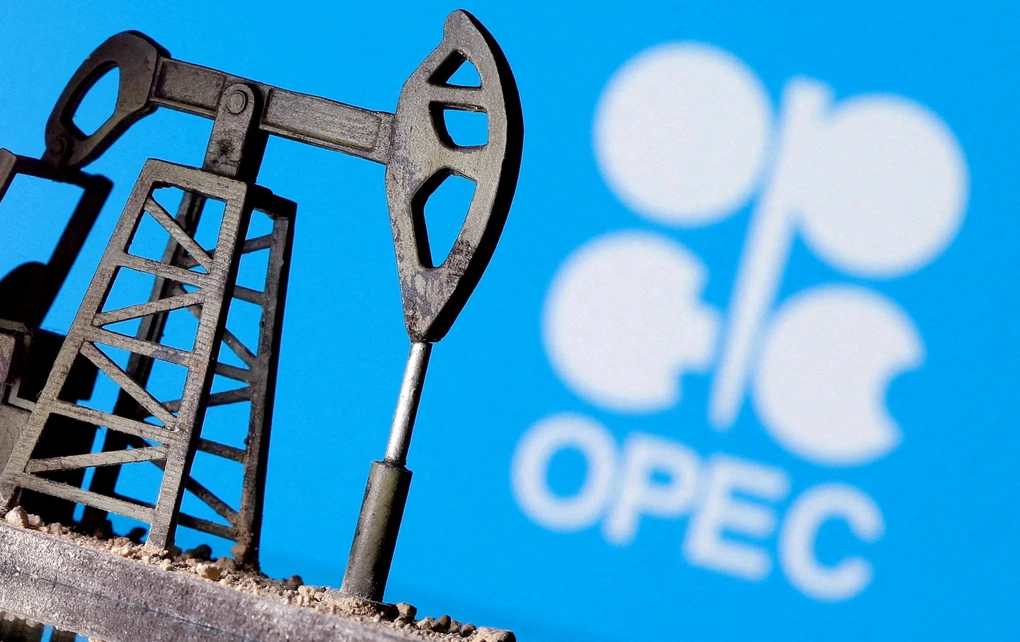Oil prices jump after OPEC+ decision
Brent crude futures rose 55 cents, or 0.85 percent, to $65.18 a barrel early this morning, while U.S. West Texas Intermediate (WTI) crude also rose 59 cents, or 0.94 percent, to $63.11 a barrel after rising about 1 percent in the previous session. Both contracts had risen nearly 3 percent in the previous session, reflecting bullish sentiment after a period of decline.
This is a strong rebound after the Organization of the Petroleum Exporting Countries and its allies (OPEC+) announced that it would increase production by 411,000 barrels/day in July, exactly the same increase as the previous two months and lower than many analysts' expectations for a stronger increase.
The decision came at a sensitive time when investors were preparing for a production "valve" from OPEC+, especially after rumors last weekend that the group would increase production to take advantage of the high oil prices. However, this "light-handed" decision made the market breathe a sigh of relief, leading to a wave of fleeing from previous short positions.
Daniel Hynes, senior commodity strategist at ANZ, said the “failure of the worst fears to materialize” had prompted investors to quickly close short positions built up ahead of the weekend meeting.
According to analysts, this decision also partly reflects a hidden calculation among members. Some OPEC+ officials revealed that the increase of 411,000 barrels/day is an attempt by Saudi Arabia to "punish" countries that produce more than their quotas such as Kazakhstan and Iraq - members that are considered to have not complied with production commitments in recent months. Meanwhile, countries such as Russia, Algeria and Oman want to pause the increase in production due to concerns about oversupply.
The next OPEC+ meeting will take place on July 6, where the future of August production will be decided and could continue to be a highlight that strongly affects global oil prices.
The Organization of the Petroleum Exporting Countries and its allies (OPEC+) announced that it would increase production by 411,000 barrels per day in July, pushing up oil prices (Photo: Reuters).
Geopolitics in turmoil: Ukraine, Iran and overlapping risks
Along with the supply and demand story, oil prices are also driven by a series of escalating geopolitical tensions.
In Europe, Ukraine launched a series of daring attacks deep inside Russian territory, using drones hidden in trucks to attack strategic air bases, even thousands of miles away in Siberia. In response, Moscow launched an hours-long drone and missile attack on the capital Kyiv—one of its largest ever.
According to analysts, these retaliations could disrupt oil production and transportation from Russia - the world's second largest oil exporter. "The tense war not only raises concerns about production but also increases geopolitical risk premiums, which the oil market is always very sensitive to," said an analyst at Energy Aspects.
In the Middle East, tensions with Iran have also rattled the oil market. The International Atomic Energy Agency (IAEA) has just released a report showing that Iran's enriched uranium stockpile has reached a record high, just a short step away from the threshold needed to produce a nuclear weapon. Iran immediately condemned the report, saying it was politically motivated and did not reflect reality. This development is expected to further stall nuclear negotiations between the US and Iran, meaning that sanctions on Iran's oil exports are unlikely to be lifted in the near future.
If Iran cannot return to the world oil market, global supply will continue to tighten, especially in the context of other OPEC+ members limiting production increases.
Wildfires, trade wars and other factors contribute to rising oil prices
Not only OPEC+ and geopolitics, natural disasters are also contributing to the high oil prices. Wildfires in Alberta (Canada) - where most of the country's oil sands mining activities are concentrated - have caused many oil and gas fields to temporarily stop production.
More than 344,000 barrels of oil per day, or about 7% of Canada's crude production, were affected, according to Reuters calculations. As the world's fourth-largest oil producer, any disruption in Canada could quickly ripple through global markets.
In addition, oil prices are also influenced by market sentiment and technical indicators. In the first session of the week, WTI oil prices broke the 50-day moving average - a technical level that has been considered an important psychological barrier in the past few weeks.
At the same time, short positions on Brent crude were at their highest since October last year, leaving the market vulnerable to a short squeeze on any positive signs of supply and demand. That’s exactly what happened after OPEC+ decided to “hold the pace.”
“The worst case scenario has not happened,” said Keshav Lohiya, founder of analytics firm Oilytics. “Short positions have been wiped out as the market has realised that fundamentals are still quite stable.”
However, investors cannot be too optimistic. Since the beginning of 2025, oil prices have still fallen nearly 15%, mainly due to the impact of the persistent trade war between the US and China - the two largest energy consuming economies in the world. Retaliatory tariffs are weakening import and production demand, leading to concerns about global energy consumption.
With variables ranging from OPEC+ production, the Russia-Ukraine war, the Iran nuclear dossier and the Canadian wildfires all adding fuel to the fire, crude oil prices are in a delicate phase. All eyes are now on the OPEC+ meeting in July, where investors will continue to scrutinize every sign of production strategy and response to geopolitical fluctuations.
Meanwhile, consumers, refiners and oil-import-dependent economies have no choice but to brace for a volatile summer.
Source: https://dantri.com.vn/kinh-doanh/gia-dau-tang-manh-giua-lan-ranh-dia-chinh-tri-va-toan-tinh-cua-opec-20250603092255621.htm
































































































Comment (0)